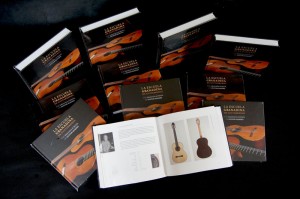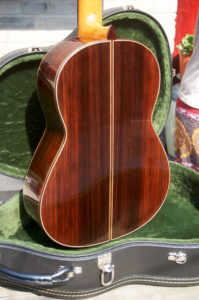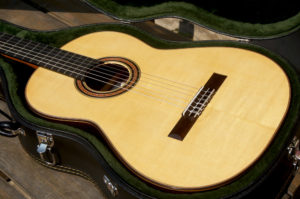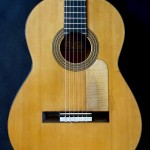制作家的灵魂
Luthier’s Soul – El Alma del Luthier
文:西班牙吉他制作家埃利亚斯·伯奈特
by Luthier: Elias Bonet Monné
( 照片-Photos: Marta Torrent )
English text below / Texto en español más abajo
双手是制作家最珍视的工具。不仅仅是因为我们需要用双手把木料切割成形,以便制作一把新吉他,更重要的是,双手是我们“聆听”木料的最好工具。
当我为一把新吉他选择木材的时候,我会用我的双手进行很多测试和思考。掂量一下感觉它的重量;按一按知道它的硬度;用指头敲一敲听听音色,感受纹理之下的内涵。以这种方式,去了解每一片木头能够提供给我们的东西,这需要非常安静、耐心地用足够长的时间掌握音板的每一个细节,找到最佳的切割位置和加工方式。
手工艺人最喜欢从精致的作品中去感受愉悦。当一个手工艺者不需要去迎合他人的认可,他就可以自由的依从于自己的灵魂,将注意力集中到他的每一步操作上,而这正是他赋予作品以生命的途径。从吉他的角度,再没有什么比缺少灵魂的吉他更令人灰心的了。而当一个手工艺人不能对每一个原材料投入感情,他也就不可能给予作品以生命。即便那些别人永远不会看到的部分,制作者也知道它们在那里。
但并非所有的吉他制作者都这样去思考问题。其中一些人在收支平衡上投入了太多的精力,而不是作品质量。自工业革命以来,有些生产定律影响到了每个领域:更低的成本、更高的产量会让你的产品更具竞争力,之后,你卖得越多,你就越优秀。这种产量上的压力抹平了每个手工艺人的个性,他们都变成了工具、产业链上的一环,为了一个共同的目标而工作。想象一下,一个吉他制作家一年可以制作超过十把吉他——我指的是高端吉他。提高产量的方式,就是在自己的作坊雇佣更多的人,或者从别人那里购买半成品。甚至让国外的代工厂去完成全部的制作工作。而当这一切发生,这些手工艺人就已经完全丧失了一个手工艺者该有的感知力。他的乐器没有得到应有的关注,他的双手没有参与到吉他孕育的过程,他又如何赋予那些工厂里的吉他以灵魂?显然,每个人都可以去选择自己的营生方式。就我来说,我独自工作,每年的成品不超过八把。我喜欢亲自完成每一个制作过程。这是了解每个细节和效果的唯一方式,进而使我在结构上可以照顾到每一块木料的特性。用心、安静的工作,可以赋予吉他们应得的灵魂。
流水线上生产的吉他可以有不错的声音,但敏感的音乐家会觉得这样的吉他里缺了点什么。感知工厂琴和手工琴的不同,只有敏感的音乐家能够做到。工厂琴通常声音很大,对于不太有经验的购买者来说,这是个很大的诱惑。想让吉他音量大是很容易做到的,但要赋予它灵气则很难。吉他是一种亲密的乐器,它无需像钢琴、小提琴、小号那般震撼,声音越大,共振的传播性越差。对于吉他来说,音色的多变性源自共振的传播能力,如果一把吉他有很宽的泛音序列,演奏者就可以在更宽的范畴里改变音色,这意味着更强的表现力。最终,一个音乐家需要最好的工具去表达他所有的情感。我问过我自己,如果一把吉他没有灵魂,音乐家如何通过它把自己的情感带给听众?这些音乐家需要从吉他中发现特别的东西。
我要说的是,在西班牙,这是一个吉他制作者的新时代。更小的产量,精益求精,拒绝粗制滥造,仅仅因优秀的作品而愉悦,这是他们的信念:制作有灵魂的吉他。
埃利亚斯·伯奈特·莫内(Elias Bonet Monné),制作家 www.eliasbonet.com
马德里,2012年12月5日
———————–
非常感谢杰出的西班牙吉他制作家埃利亚斯·伯奈特,他写下了这篇动人、有趣的文章,并且发给我专门登载于jitamen.com
Luthier’s soul
Hands are Luthier’s most prized tool. Not only because they shape wooden blocks into a new guitar, but because hands are our best tool to listen to wood.
When I choose the pieces for a new guitar, I do numerous tests and assessments using my hands. I hold each piece to feel the weight; push them to test stiffness; stroke them to hear their voice with my fingertips; knock on them to discover what is hidden in their veins. This is why, if I want to know exactly what each piece of wood can give me, I need to work calmly, taking the time to feel every grain of the soundboard, discovering the best way to make a cut, or to strike with a tool.
The craftsman loves to do a good job for the simple pleasure of a job well done. When the craftsman does not need the acknowledgment of others, he feels free to work with all his soul, attentive to every movement he makes, and this is what will ultimately make him capable of imbuing heart into whatever he does. When it comes to guitars, there is nothing worse than a guitar without a soul. And it is impossible to create a soul if the craftsman does not lovingly work every single piece. Even those pieces that nobody will ever see. Yet he knows they are there.
But not all guitar makers think the same. Some prioritise financial gain over and above product quality. Since the Industrial Revolution the common denominator of all businesses boils down to: more production plus lower costs equals more competitive products, and so, the more you sell, the better you are. This pressure on production erased any peculiarity of individual craftsmen, rendering them mere tools, part of a production line, working to reproduce identical objects. Bear in mind that a guitar maker makes an average of ten instruments per year, that is, high class instruments. The way to increase this production level is to enrol more people into your workshop, or to order prefabricated pieces from other workshops. Or even by commissioning the entire guitar construction abroad. But when that happens, the craftsman has lost all sense of being a craftsman. His instruments no longer enjoy Luthier attention. His hands no longer participate in the guitar-making process. And how could a guitar made in a factory possibly be imbued with a soul? Obviously this practice is not wrong, each and every one of us has the right to choose how to manage our enterprises. In my case, I choose to work alone, making no more than eight instruments per year. I prefer to work on each and every process personally. This is the only way to truly know each detail and virtue, the only way to continue building while bearing every single peculiarity of every single piece of wood in mind. Working hard, but calmly in order to give my guitars the soul that they deserve.
Serial made instruments may have correct sound, but sensitive musicians sense there’s something missing from them. Feeling the difference between handcrafted and factory made is something that only sensitive musicians can do. Factory guitars tend to have very powerful sound, and this is a commonly used trick when selling guitars to the less experienced. It is very easy to make a loud guitar, but it is truly difficult to make a sensitive one. A guitar is an intimate instrument, it is not as powerful as a piano, a violin or a trumpet; and the louder it is, the less harmonics it can reproduce. The tone variability of a guitar is defined by its capacity to reproduce the most harmonics. If a guitar has a wide range of harmonics, the guitarist will be able to modify the tone when playing, and this translates into more expression. These musicians are seeking something very special from inside the guitar. At the end of the day, what a musician needs is the best tool to help him express all his emotions. And I ask myself, how can a musician transmit all his emotion to the audience if the guitar he plays has no soul?
And that’s why there is a new generation of guitar makers in Spain, that want to make just a few guitars per year, working unhurriedly, trying to do the best job possible, for the simple pleasure of doing a good job, because this is precisely what they believe in: guitars with soul.
Elias Bonet Monné, Luthier
Madrid, the 5th of December 2012
El alma del Luthier
Las manos son la herramienta más valiosa del Luthier. No sólo porque sirven para modelar trozos de madera para construir guitarras. Las manos son nuestra mejor herramienta para escuchar la madera.
Cuando escojo los cortes para una nueva guitarra, hago muchas evaluaciones y pruebas a través de mis manos. Sostengo cada pieza para sentir su peso; la presiono para ver su rigidez, la acaricio para oír su voz con la yema de mis dedos; la golpeo para descubrir qué hay escondido dentro de sus vetas. En este sentido, para saber exactamente qué puede darme cada pieza de madera, es necesario poder trabajar con calma, tomando el tiempo que sea necesario para sentir cada uno de los granos de la tapa armónica, descubriendo la mejor manera de hacer un corte, o de atacar con una herramienta.
El artesano disfruta haciendo un buen trabajo simplemente por el placer de hacerlo bien. Cuando el artesano no necesita el reconocimiento de los demás, se siente libre para trabajar con toda su alma, prestando atención a cada movimiento que hace, y ésta es la manera en la que será capaz de dar un corazón a todo cuanto haga. En cuanto se refiere a las guitarras, no hay nada peor que una guitarra sin alma. Y es imposible darle una si el artesano no trabaja con todo su amor en cada una de las piezas. Incluso en esas piezas que nadie verá, jamás, aunque él sabe que allí están.
Pero no todos los constructores de guitarras piensan de esta manera. Los hay que prefieren anteponer los resultados económicos a la calidad del producto. Desde la Revolución Industrial hay algo presente en todos los negocios, y esto es: más producción con menores costos hace tu producto más competitivo, y entonces, cuanto más vendas, mejor serás. Esta presión en la producción borró toda particularidad que cada artesano tuviera, de modo que cada uno de ellos se convirtió en una mera herramienta, parte de una línea de producción, que producía objetos idénticos. Hay que tener en cuenta que un constructor de guitarras hace del orden de diez instrumentos al año, instrumentos del nivel más alto quiero decir. La manera de incrementar esta producción es la de incorporar más gente en tu taller, o encargar piezas pre-modeladas a otros talleres. E incluso encargar la total construcción de una guitarra a fábricas ajenas a tu taller. Entonces, cuando esto ocurre, se pierde el sentido de ser un artesano. Estos instrumentos ya no han tenido la atención del Luthier. Sus manos ya no toman parte en el proceso de construcción de la guitarra. ¿Cómo será posible darle un alma a estas guitarras hechas en una fábrica? Obviamente esto no es incorrecto, cada cuál puede y debe escoger cómo dirigir su empresa. En mi caso, trabajo solo, haciendo no más de ocho guitarras al año. Prefiero trabajar yo mismo en cada proceso. Esta es la única manera de saber cada detalle y virtud, y poder seguir adelante con la construcción teniendo en cuenta todas las peculiaridades de cada pieza de madera.
Los instrumentos hechos en serie pueden sonar correctamente, pero hay músicos sensibles que llegan a sentir una carencia en esas guitarras. Sentir la diferencia entre las guitarras hechas a mano y las hechas en serie es algo que solamente los músicos más sensibles pueden hacer. Las guitarras de fábrica, suelen sonar muy potentes, y este es un truco muy común para lograr vender más guitarras a aquellos que no tienen suficiente experiencia. Es muy fácil hacer una guitarra potente, pero es realmente difícil hacer una guitarra sensible. Una guitarra es un instrumento íntimo, no es tan potente como un piano, un violín o una trompeta; y cuanto más potente es una guitarra, menos armónicos puede reproducir. La variación en el timbre de una guitarra viene definido por la capacidad de reproducir cuantos más armónicos mejor. Si una guitarra tiene un amplio espectro de armónicos, el guitarrista podrá modificar el timbre del instrumento cuando lo pulse, y eso significa mayor expresividad. Al fin y al cabo, el músico necesita la mejor herramienta para poder expresar toda la emotividad que hay en él. Y yo me pregunto ¿cómo puede un músico ofrecer toda su emotividad al público si la guitarra que toca no tiene alma? Estos músicos buscan algo muy especial dentro de la guitarra.
Y es por esto que hay una nueva generación de Luthiers en España, que quieren hacer pocas guitarras al año, trabajando sin prisas, intentando hacerlo lo mejor posible, por el simple placer de hacerlo bien, porque esto es justo en lo que creen: Guitarras con alma.
Elias Bonet Monné, Luthier
En Madrid, a 5 de diciembre de 2012



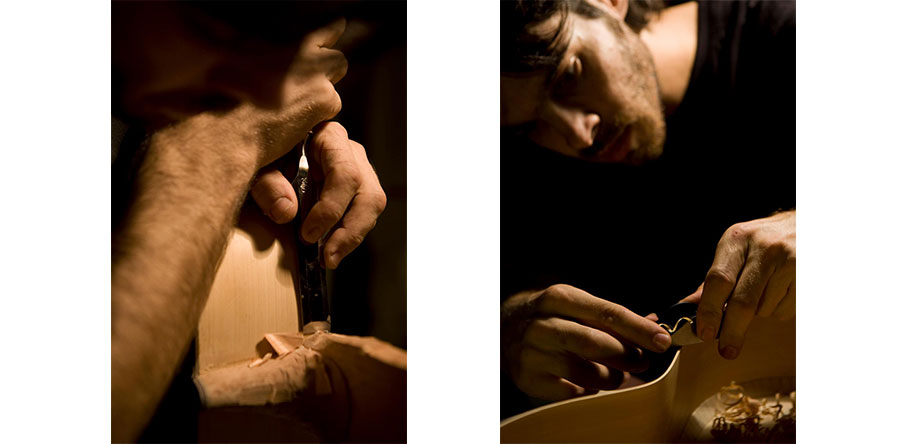
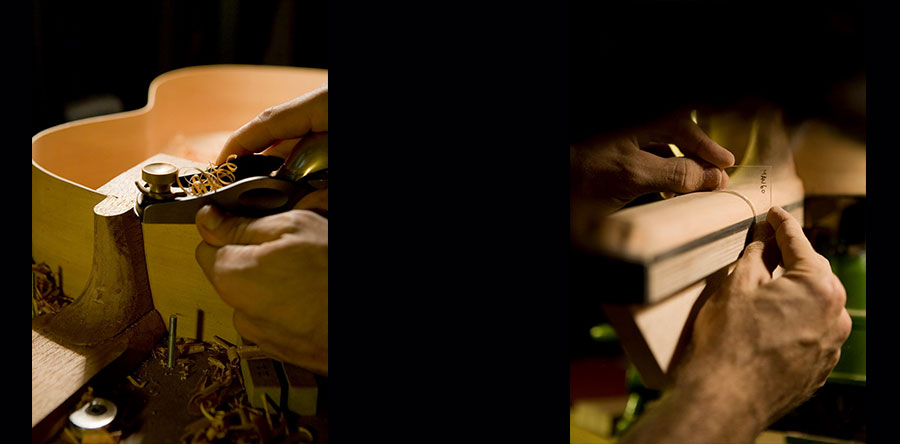


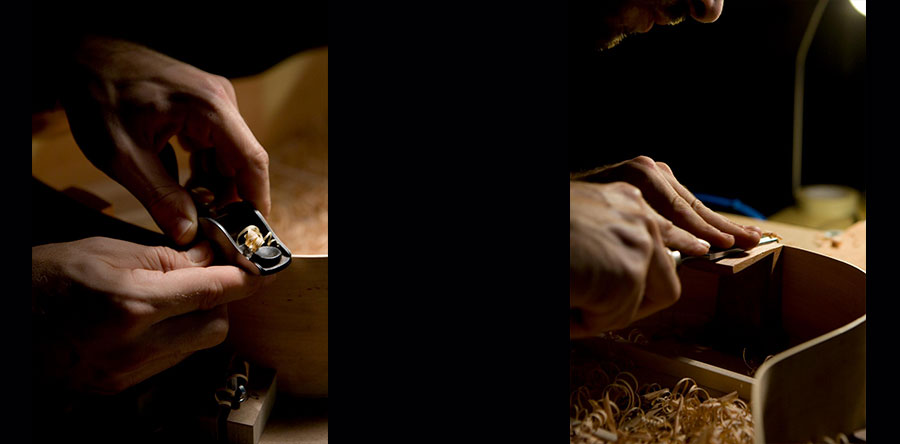
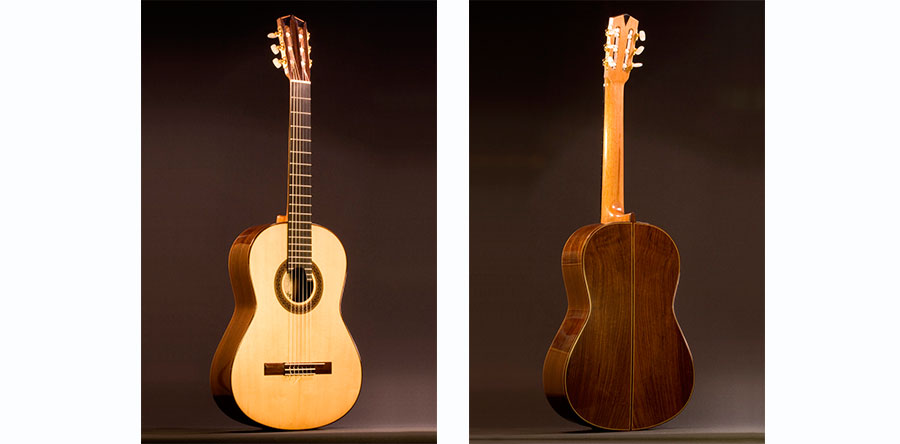


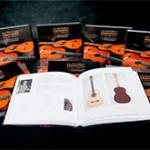
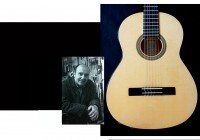




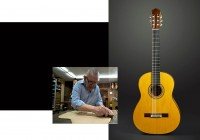



 吉他们 JITAMEN.COM 现在在北京出售的琴
www.jitamen.com/jitamenguitars/
吉他们 JITAMEN.COM 现在在北京出售的琴
www.jitamen.com/jitamenguitars/